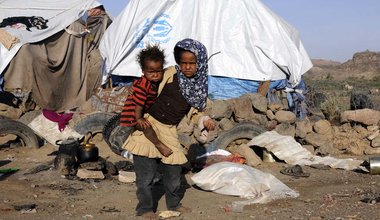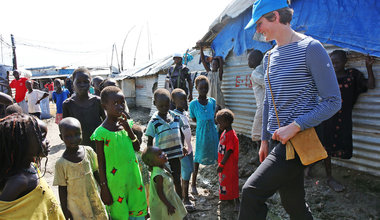UN refugee agency, African host countries agree on final steps on Rwandan refugees
 The UN refugee agency and delegations from African countries as well as the African Union (AU) agreed today on final steps to end the protracted Rwandan refugee situation after seven years of negotiations.
The UN refugee agency and delegations from African countries as well as the African Union (AU) agreed today on final steps to end the protracted Rwandan refugee situation after seven years of negotiations.
This ministerial meeting, hosted by the Office of the UN High Commissioner for Refugees (UNHCR) in Geneva, marks the last phase of a comprehensive solutions strategy for Rwandan refugees who fled their country between 1959 and 1998 to escape inter-ethnic violence and armed conflict, the agency said.
“In a world where there are more than 21 million refugees, the focus should not just be on providing protection and humanitarian assistance, but on proactively identifying solutions. The meeting today constitutes a crucial step in providing solutions to the many Rwandans who sought refuge between 1959 and 1998, and in bringing one of Africa’s most protracted refugee situations to a close,” said Filippo Grandi, the UN High Commissioner for Refugees.
The participants, who hailed from Rwanda as well as the major refugee host countries – Angola, Burundi, Cameroon, the Democratic Republic of the Congo, Kenya, Malawi, the Republic of Congo, South Africa, Uganda, Zambia and Zimbabwe – reaffirmed their commitment to bring the strategy, launched in October 2009, to its conclusion by the end of next year.
Highlighting the progress made since the last ministerial meeting on the Rwanda refugee situation, the governments reiterated their willingness to provide an alternative legal status to those refugees choosing to locally integrate and encouraged them to avail themselves of the opportunity.
All States confirmed that they will continue to promote the option of voluntary repatriation to Rwanda in safety and dignity, including by providing the refugees with comprehensive information on the conditions of return.
At the same time, UNHCR agreed to provide an enhanced return package, and to progressively transition from in-kind support to a more cash-based form of assistance to ensure their sustainable reintegration.
The countries that have invoked the cessation clause reassured that any refugee whose refugee status is maintained after an exemption process will continue to receive international protection and be supported.
The genocide in 1994, followed by armed clashes in the north-west of the country in 1997 and 1998, caused more than 3.5 million Rwandans to flee in search of safety. All but 268,500 of the refugees have found a solution, UNHCR said.
At the meeting today, UNHCR’s Assistant High Commissioner for Protection, Volker Türk, underlined that the agency stands ready to continue working with the States hosting Rwandan refugees to find solutions in accordance with the strategy and within the set timeline of December 2017.
 UN
UN







